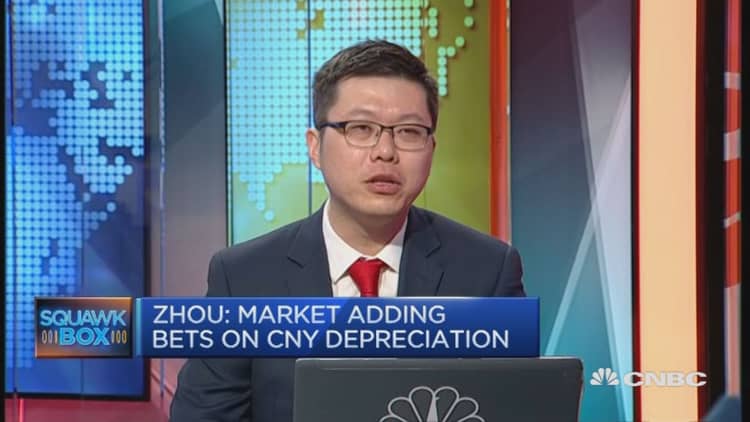Two and half years ago when China's Premier Li Keqiang was visiting Kenya, he told journalists that the excessive amount of foreign exchange reserves "has become a very big burden" for Beijing because they distorted the country's domestic monetary policy.
At that time, China had witnessed an almost unstoppable rise in the level of its foreign exchange reserves for more than a decade; it seemed that a big stockpile of foreign exchange would continue to increase to haunt Beijing.
Few anticipated that China's reserves would hit an all-time peak the month after Li's comments – and even fewer would have expected that Beijing needed to worry about a fall in those same reserves so soon.
Analysts said an important consideration behind the Chinese government's decision to impose more vigilant checks on outbound investment deals was to safeguard Beijing's foreign exchange reserves after the world's largest stockpile of foreign exchange fell by $837 billion from its $3.99 trillion peak at the end of June 2014. China's foreign exchange reserves at the end of October stood at $3.12 trillion.
"As China's foreign exchange reserves fall, there's a visible shift in policy to defend the reserves," said Wang Youxin, a researcher at Bank of China.
"The government doesn't want to see the reserves shrinking too quickly, and it's a big change from the days when the reserves were seen as more than enough."

In terms of an absolute amount, China's foreign exchange reserves are still the world's largest – far larger than those of Japan and Saudi Arabia – but it is the rate at which they are falling that is ringing alarm bells.
Yan Se, a senior economist at Standard Chartered Bank, said China's reserves faced real pressure of shrinking further in future.
He said China's foreign exchange reserves faced "a double whammy" because of the long-term trend of outbound investment and short-term speculation to buy dollars, which meant China's "capital account deficit" was likely to widen.
More from the South China Morning Post :
Three clues to reading the Chinese economy's fortune in 2017
China's foreign investment 'shopping spree' over as Beijing moves to slash capital outflow
China's central bank talks up the yuan against US dollar 'uncertainties'
China became a net capital exporter for the first time in 2015 as outbound direct investment rose for the 13th year in a row to US$145.67 billion – outstripping foreign direct investment of US$135.6 billion.
The debate about the role of foreign reserves has been going on for years, if not decades.
In the early days of the People's Republic of China, when hard currency was rare, the ruling Communist Party had, for the most part, regarded the US dollar as a strategic state asset and kept it only in hands of state agencies and organs.
When Deng Xiaoping led a China delegation attending the United Nations assembly in 1974, he used up his pocket money of about US$20 to buy baguettes to take back to Beijing to share with his comrades, according to an article, published in 2004 in the Chinese Communist Party news section on the People's Daily website.
The Asian financial crisis in the late 1990s further cemented the view that China needed a deep pool of reserves to cope with possible capital flight and external shocks.
A framework of capital control rules were set in place to encourage inflows – and discourage outflows.

The country's reserves started to take off after its entry into the World Trade Organisation in 2001 as a huge trade surplus and an influx of investment funds quickly led the reserves to balloon.
In 2006, China overtook Japan to become the country with the biggest foreign exchange reserves. That year, China's reserves exceeded US$1 trillion and that total almost quadrupled over the following eight years.
China's central bank had to keep printing yuan to buy incoming dollars, leading to excessive liquidity in the domestic market, which in turn caused asset bubbles.
In the process, Beijing began to change its tactics.
It started to encourage individuals to hold dollars. In 2007 it launched the $50,000 quota for all residents, making it easier for Chinese consumers to travel and shop abroad.
Beijing has also stepped up its efforts to diversify its reserves away from US Treasuries into other forms of assets. To this end, China created its own sovereign wealth fund and also eased state company deals in overseas markets with foreign currencies.
Apart from oil and iron ore deals by China's state-owned enterprises, China's well-connected businesses, including Anbang Insurance Group and Dalian Wanda Group, are making headlines in New York and London by taking over trophy assets.
Anbang, a decade-old insurer, paid US$1.95 billion to buy the Waldorf Astoria hotel in New York, the place where Deng stayed during his 1974 trip, while Wanda has made headlines for its raft of high-profile deals of cinema chain AMC Theatres, the film company Legendary Entertainment, and British yachtmaker Sunseekers.
Now, the wind is changing again.
Louis Kuijs, head of Asia economics at Oxford Economics, said China's past worries about excessive capital inflows via the capital account had been quickly replaced by concerns over the outflows.
"But now situation is very different," Kuijs said. "It's not that we are at all worried about the level of the reserves, because they are plentiful, but ... the point becomes how we can reduce that drainage of reserves."

